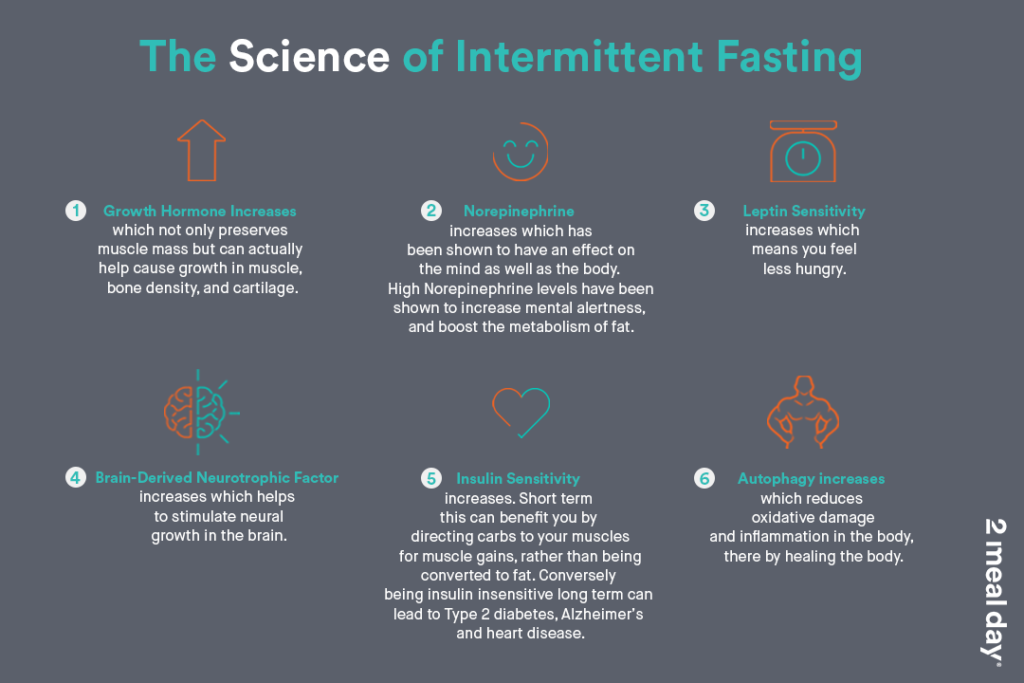The Complete Intermittent Fasting Guide For Beginners
What is Intermittent Fasting and Why Should You Do It?
Intermittent Fasting is a general term for various eating patterns that involve fasting (not eating) for short periods of time. Unlike a typical weight loss diet or weight loss plan that restricts how much or what you eat, it’s all about integrating periods of fasting into your day to reap the many proven health benefits of Intermittent Fasting like burning stored body fat for energy, feeling less hungry and improving many biomarkers of health.
In my opinion, Intermittent Fasting is a more natural way of eating. Rather than eating because the clock tells you to, or because “breakfast is the most important meal of the day”, you learn to eat when you are hungry. This is why Intermittent Fasting diets are key becoming a successful lifestyle change for hundreds of thousands of people all over the world.
The Western world has only been eating three meals a day for 400 years or so. This may seem like a long time but Homo sapiens (us) have been around for 200,000 years – eating three meals day is not based on our biological needs but started due to cultural reasons.
It’s important to realise that Fasting is not a new idea. Every ancient culture and religion has used Fasting in some way – to cleanse and heal the body.
How Does Intermittent Fasting Work?
In order to understand how Intermittent Fasting works, you need to first know about the different metabolic states that the body goes through when we eat food.
The Fed State (AKA. The absorptive state)
The Fed State occurs after a meal when your body is digesting the food and absorbing the nutrients. Digestion begins the moment you put food into your mouth, as the food is broken down into its constituent parts to be absorbed through the intestine. Insulin is also elevated, and this signals your body to store any excess calories in your fat cells. In the presence of insulin, the burning of fat is halted, while the body burns glucose (from your last meal) instead.
The Fasted State – (AKA. The post-absorptive state)
The Fasted State occurs when the food you eat has been digested, absorbed, and stored. You commonly fast overnight but skipping meals during the day puts your body in the post-absorptive state as well. Initially, your body depends on glycogen (stored carbohydrate) to fuel itself but as insulin levels drop (while glucagon and growth hormone, opposing hormones to insulin, rises). The body starts mobilizing stored body fat from your fat cells and burning this fat for energy (instead of glucose).
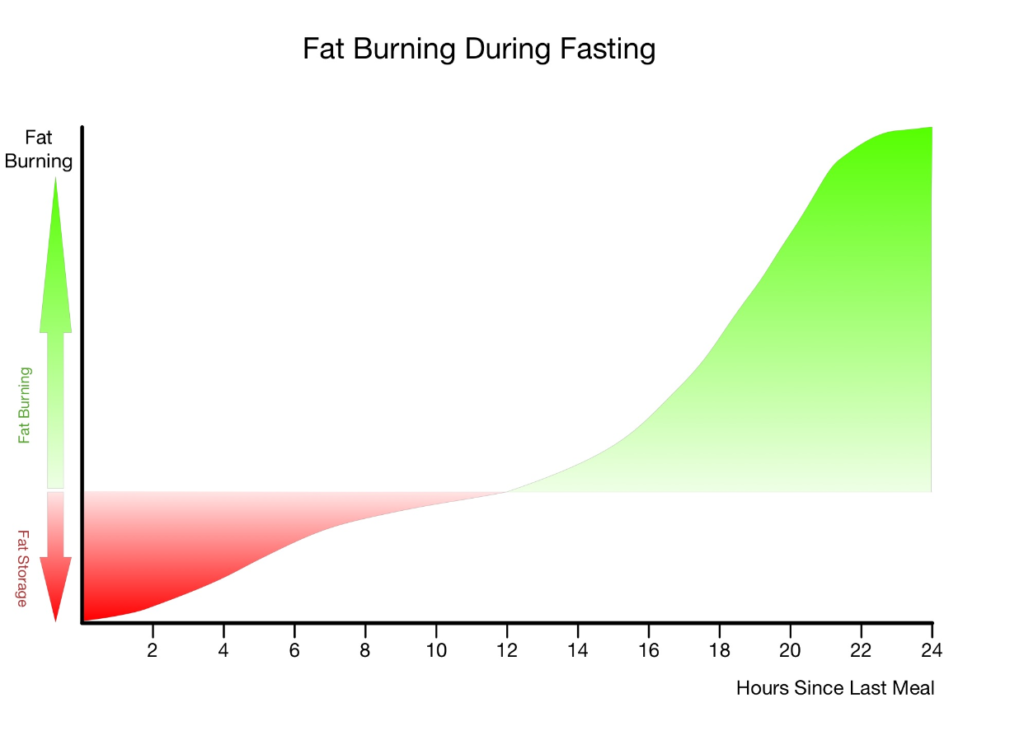
Intermittent Fasting or extending your overnight fast allows you to spend time in the fasted state, which means you are using stored body fat for fuel. This is a completely normal process and is one of the many evolutionary advantages we have developed in order to survive in harsh times when there wasn’t much food around.
There are many Intermittent Fasting benefits that you can gain from being in the fasted state, like fat loss, having more energy and feeling less hungry.
The 2 Meal Day and Intermittent Fasting
My online plans – Your 2 Meal Day and Your Vegetarian 2 Meal Day – are the product of years of self-experimentation, research, and work. I started 2 Meal Day with the intention of creating the simplest and most effective form of Intermittent Fasting and I am proud to say that I believe I have done that.
2 Meal Day incorporates Intermittent Fasting into a sustainable lifestyle and has the profound effect optimising one’s fitness, health and overall wellbeing. The 2 Meal Day plan is fully online-based and provides you with all the tools to incorporate Intermittent Fasting into your life, achieve your health and fitness goals, and make them stick! The plan includes a catalogue of nutritious and simple to cook recipes that are all tailored to your individual macronutrient and calorific needs, hours of follow-along exercise videos, and all my in-depth guides on how to succeed with this Intermittent Fasting approach. I also provide unlimited email support for all plan holders to provide assistance and advice whenever it is needed.
If you would like to find out more about how intermittent fasting can help you lose weight, eat the foods you love, without calorie counting. Get my FREE Intermittent Fasting Short Course.
The Benefits of Intermittent Fasting
Numerous studies show that Intermittent Fasting can have powerful benefits for your body and brain. Additionally, it can completely transform the way you approach food and empower you to become more in tune with your body.
The Health Benefits of Intermittent Fasting
Intermittent Fasting is proving to be a simple and effective strategy for avoiding major dietary changes while achieving strong effects not just for one disease risk factor, but for an array of factors that constitutes the foundation for metabolic syndrome, cardiovascular disease, cancer, and possibly neurodegenerative diseases. Most importantly it is becoming a way of life for so many people.
Fat Loss
I use “fat loss” and not “weight loss” intentionally. Intermittent Fasting has been shown to be effective for reducing fat mass but retaining lean muscle mass – which is incredibly important for lasting weight loss. This is primarily due to growth hormone which is released when in a fasted state.
Improved Insulin Sensitivity
Being insulin sensitive has been shown to drastically reduce your chances of getting Type 2 Diabetes and metabolic disease. This is a big issue at the moment with one in ten people in the developed world having Type 2 diabetes, but it has been estimated that by 2050 the figure could be as high as one in three.
Lower Blood Pressure
Many studies have documented a significant reduction in blood pressure. One study even went as far as to say that it was just as effective as blood pressure-lowering pills.
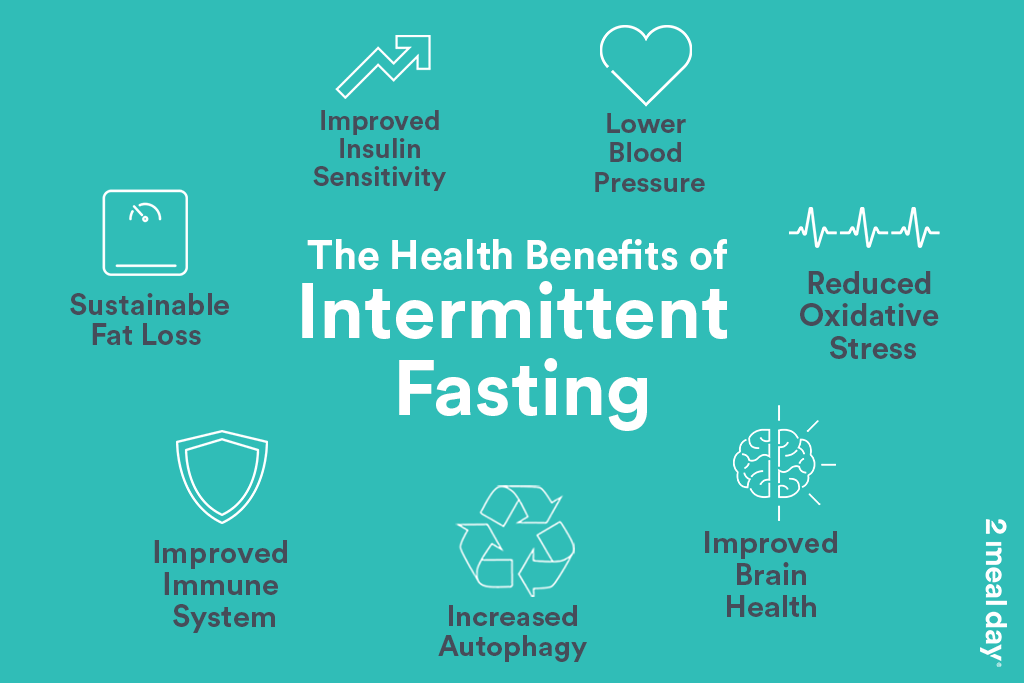
Reduced Oxidative Stress
Oxidative stress is one of the steps towards ageing and many chronic diseases. It involves unstable molecules called free radicals, which react with other important molecules (like protein and DNA) and damages them. Several studies show that Intermittent Fasting may enhance the body’s resistance to oxidative stress.
Improved Immune System
Fasting has been shown to lower white blood cell counts, which in turn triggers the immune system to start producing new white blood cells. White blood cells (or lymphocytes) are a key component of your body’s immune system.
Study: Fasting triggers stem cell regeneration of the damaged, old immune system
Increased Autophagy
Autophagy is essentially your body’s recycling system. Your cells create membranes that probe for scraps of dead, diseased or worn-out cells. They cannibalise them and use the resulting molecules for energy or to make new cell parts. This process can slow cancerous growths and stop metabolic dysfunction like obesity and diabetes, which are both contributors to heart disease.
Improved Brain Health
Intermittent Fasting improves various metabolic features known to be important for brain health. This includes reduced oxidative stress, reduced inflammation and a reduction in blood sugar levels and insulin resistance. It also increases levels of a brain hormone called brain-derived neurotrophic factor (BDNF) a deficiency of which has been implicated in depression and various other brain problems.
The Benefits of Intermittent Fasting to Your Day to Day Life
More Energy
The combination of using stored body fat for fuel, a hormone called norepinephrine being released, and freeing up energy from digestion means you have a lot more energy! So much so that some people report feeling a buzz from Intermittent Fasting. This can help you to reduce caffeine and sugar consumption.
Less Hungry
People seem to be most surprised that reduced hunger is one of the benefits of Intermittent Fasting. After the initial transitional period when your body gets used to a new way of eating, you will find yourself thinking about food less. Intermittent Fasting normalises your hunger hormones (ghrelin and leptin) allowing you to feel real hunger which occurs every 16–24 hours. This is one of the most empowering benefits of Intermittent Fasting. You become self-sufficient, no longer a slave to the clock, counting down the minutes until you can next eat; you are completely in tune with your body.
Improved Mind-Body Connection
For me, Intermittent Fasting has allowed me to be much more in tune with my body. I am more sensitive to how things affect me, whether its food, alcohol, exercise or lack of sleep. Long term, this is very important because it allows you to make the right choices for you. Only you know if something is right for your or not, Intermittent Fasting gives you the tools to be able to tell.
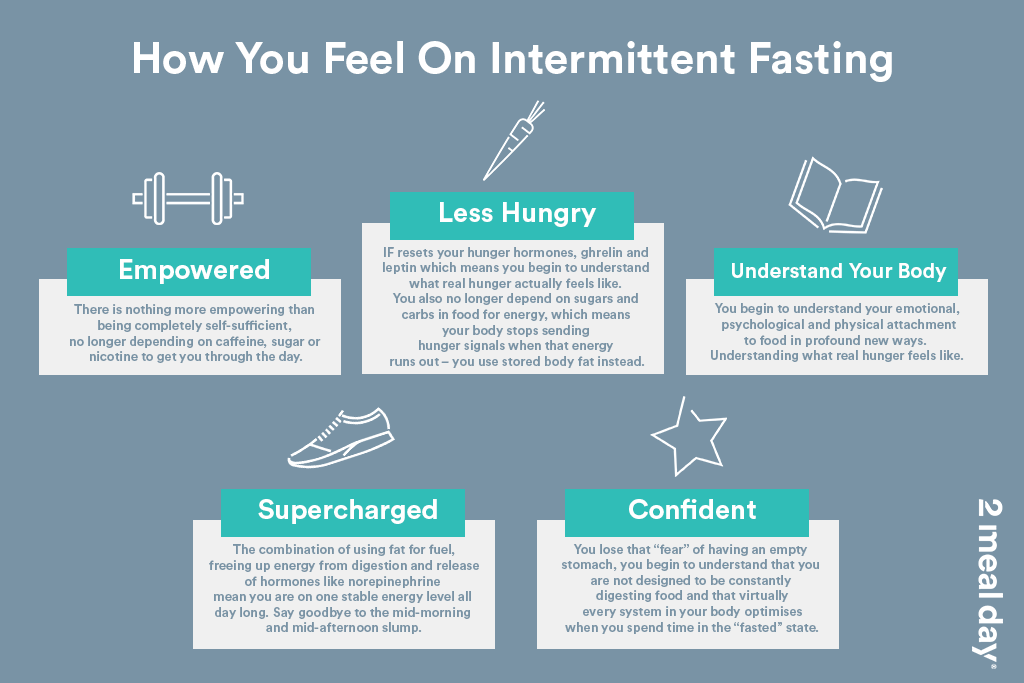
How I Discovered Intermittent Fasting
I discovered intermittent fasting completely unintentionally while travelling through South America. I was trying to live as cheaply as possible, so I only ate one or two big meals a day, at the same time as training hard and going on 6–8-hour hikes up mountains at least once per week. When I got home I weighed myself, I’d lost an incredible 7kg, yet I was more muscular than I had ever been. I then returned to my normal routine – eating three meals a day, and I quickly put the weight back on. I have never had any problems building or maintaining muscle, but I just wasn’t as lean as I was when I was away. Without realising it, in South America, I had been following a type of Intermittent Fasting.
After further research, I decided to experiment with a daily fast, which I called the 2 Meal Day (2MD). I skipped breakfast and ate just lunch and dinner so that I was fasting for 16-18 hours every day. I found 2 Meal Day to be the simplest, most effective way to lose weight and reap the many benefits of fasting – no calorie counting, obsessing over when to eat or feelings of deprivation: the two meals I did eat were big and very satisfying.
Intermittent Fasting for Weight Loss
A systematic review of 40 studies found that intermittent fasting was effective for weight loss, with a typical loss of 7-11 pounds over 10 weeks.
Although many studies show that the weight loss from intermittent fasting is equal to the weight loss from traditional calorie restriction, I believe that intermittent fasting has a whole host of other benefits that can mean it becomes a sustainable way of life, rather than a crash diet that you do in the short term.
This predominately comes from the different hormonal and metabolic changes that happen when fasting, which don’t happen with calorie restriction.
Additionally, many people report that intermittent fasting is effortless. You eat two larger meals with one optional snack, for many people, it feels like they are eating more than before but studies have shown that despite the feelings of over consuming they are still eating less than if they had eaten three square meals with snacks. With traditional calorie restriction, you will feel deprived at each meal, which is completely unsustainable.
On top of this, you feel less hungry and have more energy due to the fact that your hunger hormones balance out and you start using fat for fuel, which doesn’t happen with calorie restriction.
It’s importnat to note, that Intermittent Fasting is one (effective) tool in your toolbox. In order to get sustainable fitness and fat loss results, you must look at all your available tools.
Intermittent Fasting for Muscle Growth
Contrary to popular belief, it is very possible to build muscle following an Intermittent Fasting program. I personally have put on around 3kg of lean mass in 18 months when I started Olympic Lifting full time. At the same time, I managed to stay lean, I put on very little body fat.

There are studies that show that testosterone and human growth hormone levels increase when fasting.
Both these hormones have a big effect on muscle growth. Intermittent Fasting effectively creates the right hormonal environment for your body to use fat for fuel and build muscle in combination with resistance training and an increase in calorie intake.
Traditional “bulking” programs focus on putting as much weight as possible on, with no focus on where that weight is coming from, is it fat, or is it muscle?
Intermittent Fasting can be used as an effective tool to put on lean muscle but prevent excess fat from being put on at the same time.
It’s important to note, if you find it difficult to eat in a calorie surplus and you want to gain muscle, then Intermittent Fasting might not be the best option for you.
Intermittent Fasting restricts the time in which you can consume calories, there by making it harder to eat in a calorie surplus, which is an essential component to gaining muscle.
Additionally, you will not get any muscle building benefits if you are not following an effective hypertrophy or strength training program.
Lift heavy things, eat more food and enjoy the benefits of Intermittent Fasting for optimal muscle growth.
Is Intermittent Fasting Safe for Women?
I’m going to start by saying that 70% of the people buying my 2 Meal Day Intermittent Fasting Fat Loss Plans are women… and they are having great results! This is because they have incorporated Intermittent Fasting in a safe and effective way.
Unfortunately, women are more sensitive to physical stress than men. The only time I have seen certain women have issues with intermittent fasting is because they are doing too many things at once – overtraining, under sleeping, high-stress job, restricting calories and then they try intermittent fasting as well!
Intermittent fasting is relatively new to the mainstream medical system and unfortunately, to date, there haven’t been any conclusive studies conducted on the effects of intermittent fasting on women specifically.
However, there is a large body of anecdotal evidence to suggest that women can follow an intermittent fasting program with absolutely no issues at all, it all comes down to finding the method that works for the individual and as always, learning to listen to your body.
Get My FREE Intermittent Fasting Short Course
Intermittent Fasting FAQs, Myths, and Misconceptions
Does Fasting slow down your metabolism?
Myth! This is completely false. In fact, the opposite is true. Lower insulin levels, higher growth- hormone levels and increased amounts of norepinephrine all increase the breakdown of body fat and facilitate its use for energy. For these reasons, short-term fasting actually increases your metabolic rate by 3.6–14 per cent, helping you burn even more calories.
Are Fasting and Starvation the same thing?
No. There is a vast difference between fasting and starving. In the absence of food, your body systematically cleanses itself of everything except vital tissue. Starvation only occurs when the body is forced to use vital tissue to survive.
The goal of fasting is not to calorie restrict, but to restrict meal frequency. On the 2 Meal Day, all you are doing is eating your first meal a few hours later (if you are a breakfast skipper). When you do eat, you eat until you are full, enjoying every bite!
Will Fasting cause your muscles will waste away?
This is a Myth. One of the side effects of fasting is a rise of growth hormone (GH) in the blood, which can increase by up to five times. Higher levels of GH facilitate fat-burning, muscle building and prevent muscle wastage when supported by the nutrients provided by your two meals.
Will Fasting mess with women’s hormones?
As explained above, if done correctly fasting can be a safe and effective way of life for women.
What breaks my fast?
Many people talk about anything less than 30cals is fine to eat during fasting hours. As far as I can see this is made up, there is no research to suggest this anywhere (that I have found). Anything that contains calories will take you out of the fasted state. Stick to water, green/black tea, and black coffee.
What about eating 6 small meals a day for weight loss?
I am not saying that intermittent fasting is the only tool for weight loss. You could get great results eating 6 small meals a day. However, in my experience training hundreds of clients, the big difference is that eating 6 small meals a day is completely unsustainable! Not only is it a lot of effort to cook and eat six meals per day, it takes the enjoyment out of food. You also won’t get the added health benefits that you get from giving your digestion a break. In my opinion, grazing on food all day is completely unnatural and could mess with your natural rhythms – you will feel hungry all the time!
What time should I break my fast?
The reason I started the 2 Meal Day was to take the focus away from time periods. When you focus on time periods or counting calories you can end up getting obsessed and eating because the clock tells you to rather than listening to your body. When you first start fasting you may have to be strict with the 14-16 hour gap you are aiming for, but once you are using body fat for fuel and your hunger hormones have normalised you should eat your first meal when you feel hungry! Some days this might be 11am some days it might not be until 2-3pm. The beauty of this way of eating is you will learn when your body needs food and when it doesn’t.
How many days per week can I fast?
The 2 Meal Day isn’t about calorie restriction, so you could adopt the methods every day. With other intermittent fasting programs, it varies depending on the amount of time you fast for or if you are restricting calories. Ultimately you decide how many days per week you do it, once you understand your body better you can incorporate it how you see fit. Most people find they do it most days because they feel so much lighter, more energised and empowered!
Who shouldn’t try fasting?
Anyone with any pre-existing medical condition needs to consult a doctor before trying intermittent fasting. Pregnant and breastfeeding women should not try Intermittent Fasting and anyone with a history of eating disorders and a bad emotional relationship with food should be very careful with Intermittent Fasting.
Are there side effects of Intermittent Fasting?
Initially, there may be some negative side effects from fasting. Your body will transfer from using sugar and carbohydrate from food for energy to burning stored body fat. In that transition, you may feel tired, hungry, irritable, lethargic and you may get headaches. One of the best ways to combat these side effects is to drink a glass of water with a pinch of salt mixed into it. The transition will be different for everyone but it should only take a few days.
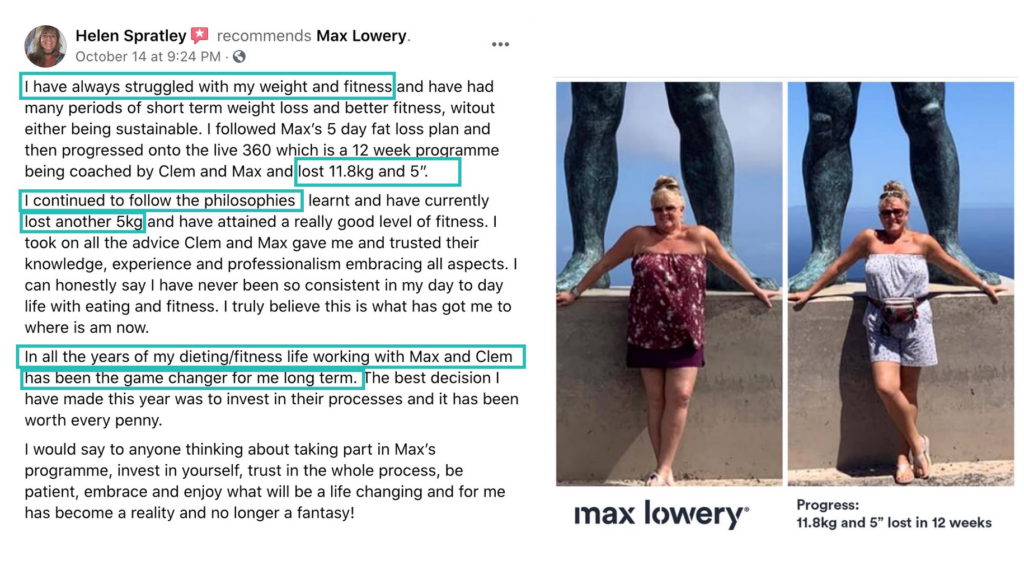
Top Intermittent Fasting Tips
Cook from scratch from fresh ingredients
My food philosophy is simple: eat locally sourced, seasonal foods full of nutrients. In other words, eat real food. The body is not designed to constantly digest food and once you start eating foods that nourish your body you quickly realise that you don’t need to eat every three to four hours. You begin to recognise what real hunger feels like, empowering yourself with the ability to become self-sufficient. You will never be a slave to mealtimes again!
Don’t obsess over “fasting hours”
If you want Intermittent Fasting to become a way of life, you need to learn to listen to your body and eat because you are hungry, rather than because the clock tells you to. It might be hard at first but obsessing over eating windows and counting down the hours until you can break your fast is going to create an unhealthy relationship with food. Some days you might feel hungrier earlier, so eat. Some days you may not feel hungry until later, so don’t eat.
Don’t do too much at once
If you are just embarking on your health and fitness journey, do not bite off more than you can chew (no pun intended). Many people go from doing nothing to training 5-6 times per week, restricting food groups and intermittent fasting on top of those things. Do one thing at a time and in a progressive way. It can take time for your body to adjust.
Do NOT calorie restrict at the same time as doing Intermittent Fasting
To clarify, there is a big difference between Calorie Restriction and Intermittent Fasting. If you calorie restrict on top of Intermittent Fasting you may end up undereating. This is not the aim of Intermittent Fasting, it is really important that you eat until you are full at each meal. This is the key to its success, you eat until you are full at each meal and still reap the fat loss and health benefits!
Enjoy the process
This can apply to any change in lifestyle, only once you enjoy the process of intermittent fasting will you make it into a way of life. Learn to love the feeling of having an empty stomach, you feel light, energised and empowered. Notice the difference in energy after you eat and be mindful when you do eat, enjoy every bite and savour it.
Common Intermittent Fasting Mistakes
Intermittent Fasting is quickly getting the global exposure that it deserves as a way of life. But I see many people make Intermittent Fasting mistakes all too often when they begin fasting and these mistakes often have a huge impact on their success or failure.
Thinking Intermittent Fasting a magic pill for weight loss
Unfortunately, people think that intermittent fasting is a magic pill. Yes, it is an incredibly effective tool to take control of your health but it won’t cancel out eating a diet full of processed foods and sugar.
Not drinking enough water
Ideally, you will drink more water than you usually would. At least 2 litres per day, most of that during your fasting period. Not only that, drinking water, particularly sparkling water can help you to feel full, which is important when you are first getting into IF.
Don’t be too ambitious
You wouldn’t walk into a gym and put a 250kg barbell on your back and try and squat it, would you? Equally, don’t jump into doing 16+ extended fasts. Start small, say 12 hours and work your way up to 16 hours. This way you won’t shock your body and it will mean it will become a way of life rather than a crash diet.
Read Next:
Why The 2 Meal Day Could Change Your Life This Year
The Difference Between Intermittent Fasting and Calorie Restriction
